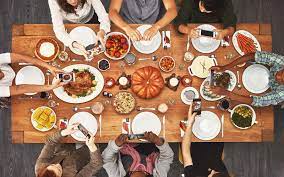
How are you feeling about the approaching holiday season? As we near the end of 2022, our first “Post Pandemic” year, we know that re-entry into society has taken on different forms for different people. For some, it has presented a real challenge.
As we prepare for upcoming holidays, Tysons Interfaith is pleased to offer a series of blog posts authored by members of our faith communities that highlight reflections on self, our place in the world, and suggestions for re-entering society and promoting comity among family and friends.
We need to socialize-we are social creatures. We need to be able to have community, to come together, to share a language, a friendship. Covid changed all that. Isolating at home became the new normal. Now with vaccines and anti-viral medications, people are returning to socializing indoors and outdoors. This can lead to anxiety for many people. Taking a gradual approach will help most people ease back to socializing again.
We adapted to a new reality, living with the uncertainty and fear of the impact of a deadly Covid virus. We were forced to physically distance from family and friends with video calling becoming the primary way of socializing. It was challenging. We are creatures of habit, but we became accustomed to isolating at home. Now that we are used to isolating, it will be another transition to engage in person with others both indoors and outdoors.
Dealing with long periods of isolation can increase social anxiety even for those who are naturally extroverted. For those of us who enjoyed the isolation because of underlying social anxiety or being introverted, the return to awkward social situations is even more terrifying. You are not alone. Many people are dealing with these same feelings.
We have missed out on subtle forms of communicating like facial cues and body language which don’t come across over video or talking to people with masks on. The introvert and those with a diagnosis of social anxiety may have felt “comfortable” for the most part during the lockdown. Their challenge is having to deal with their difficulties in returning in person to social situations. Be understanding of your situation and the situation of others. Gradually begin to restart your social interactions, at first with people you are comfortable with. Make your initial interactions short, gradually increasing the time as your comfort level improves. Reward yourself for your effort by indulging in a solitary activity that brings you joy. Be kind to yourself. This might not be easy. Be kind to others. This may be difficult for them too.
Social anxiety, generalized anxiety, agoraphobia and other issues may require extra help. For those with conditions that impact their ability to function in society and are not successfully making the transition, professional help may be required.
As we enter the busy holiday season, here are a few of my thoughts on ways to keep one’s equilibrium:
CONNECT WITH LOVED ONES
HAVE A SENSE OF PURPOSE
FIND WAYS TO BE OF SERVICE
EXERCISE, GET GOOD SLEEP, EAT WELL
LIMIT SCREEN TIME AND AVOID GETTING OVERLOADED WITH INFORMATION YOU ARE UNABLE TO DO ANYTHING ABOUT
MAKE SURE YOUR INFORMATION IS COMING FROM A RELIABLE SOURCE
FINDING HOPE AND OPTIMISM CAN HAVE A POSITIVE IMPACT OR YOUR MENTAL AND PHYSICAL HEALTH

How are you feeling about the approaching holiday season? As we near the end of 2022, our first “Post Pandemic” year, we know that re-entry into society has taken on different forms for different people. For some, it has presented a real challenge.
As we prepare for upcoming holidays, Tysons Interfaith is pleased to offer a series of blog posts authored by members of our faith communities that highlight reflections on self, our place in the world, and suggestions for re-entering society and promoting comity among family and friends.
So, I’m invisible? Black women more often go unnoticed, according to this article.
As an Ethiopian-American woman, I devised defense mechanisms to avoid discrimination. I ignore the color of people’s skin. I choose to see the world through people’s eyes, instead of waxing philosophical about the color of people’s eyes. My perspective is shaped by people’s words and their actions, not their silhouette. You can have extra curves and I won’t dwell on it.
How we perceive the physical world directly affects our spirit. I spend one minute focused on my perceived invisibility and I’m down in the dumps. But, no, my heart will go on. Did I not cry as I watched the Titanic sink? Do I not write poetry about world hunger? As Sade put it in the “King of Sorrow,” “I’m crying everyone’s tears.”
If you are reading this, it means you trust me with your heart and soul. We read to experience the heights and depths of emotion and intellect. You have probably heard my laugh. It’s a loud, contagious cackle. I smile all the time. I get depressed. At times, I feel invincible and sometimes I can’t sleep, because there’s a world in need of repair (tikkun olam). I’m restless, but I enjoy sitting for hours drinking tea and eating lamb kabobs, hummus, falafels and baba ghanoush with my friends. It takes little to make me happy. Happiness is a heartbeat away! Are you breathing? Say, “Amen!”
And that’s all I have to say, “So be it!” If you want to change the world, appreciate the people around you. Love yourself. Seek opportunities to cherish diversity. The world is not so black and white. Those are two extremes. We meet somewhere in-between. Choose to see the best in people and give credit where credit is due. Remember everyone makes an important contribution. Defy stereotypes. Life is too short to hide behind descriptions that distance us from each other. We are meant to know one another (Qur’an 49:13). We are designed to love and be loved. If you go unnoticed, your soul is still of infinite worth and you are beautiful as you are.
Remember what Hagar said, “You are the God who sees me” (Genesis 16:13). If you’re hurt or if you suffer, trust that God is near. He has a purpose for your pain. Intimacy with God is to be treasured. He is closer than your jugular vein. Also, surround yourself by people who care about you and be uplifted. Don’t worry about what the polls say. You are precious. Tear down any barrier within yourself that is an obstacle to giving and receiving love (Rumi). Love is sometimes hidden, but you don’t have to hide anymore. Let your light shine, even if that light is blinding. So what, if no one notices? Be. Sometimes that’s all God commands and miracles happen.

How are you feeling about the approaching holiday season? As we near the end of 2022, our first “Post Pandemic” year, we know that re-entry into society has taken on different forms for different people. For some, it has presented a real challenge.
As we prepare for upcoming holidays, Tysons Interfaith is pleased to offer a series of blog posts authored by members of our faith communities that highlight reflections on self, our place in the world, and suggestions for re-entering society and promoting comity among family and friends.
The interfaith community has observed a noticeable reluctance to rejoin in-person sociality after the isolation of COVID lockdowns. It may be that it’s just easier or feels safer to attend online. For others it may be the challenge of depression or addiction resulting from isolation.
In addition, recovering from COVID isolation during the upcoming holiday season intersects with the long-standing problem of isolation and disappointment felt by many during the holidays.
The phrase “to put yourself out there,” while it may be overused, has an important element of truth: there is risk in trying to develop or maintain a friendship. What if my outreach is not reciprocated?
Nevertheless, people need people. A friendly word, a smile, an unexpected act of kindness, or an interest in others can be life-changing or at least help us through another day. It’s been said that if you are with a group of people and assume that half of the group is facing a life crisis, you’ll be right most of the time. Whichever half we’re on, in-person interactions can be the “Balm of Gilead.”
Call upon your faith in God to help you have the courage to make the effort to resume in-person sociality by trying to focus on lighting up someone else’s life. Try the smile, the compliment, the kind word, an unexpected card or gift. Especially in all-important family relationships, express appreciation, offer help, ask for forgiveness, give forgiveness, or if needed make an apology. Listen. Look for common ground. See the good in others; everyone has a gift and talent.
If we feel alone, volunteer to help others. With thousands of refugees and new immigrants in Northern Virginia, the needs are great. In volunteering you meet the best people in the community. You may wish to visit the Tysons Interfaith website Resources page, which lists volunteer opportunities and area non-profits with whom our faith communities partner. When we lighten the burdens of others, our burdens seem lighter.
Take advantage of your unique opportunity to fill the world with peace and goodwill this holiday season!
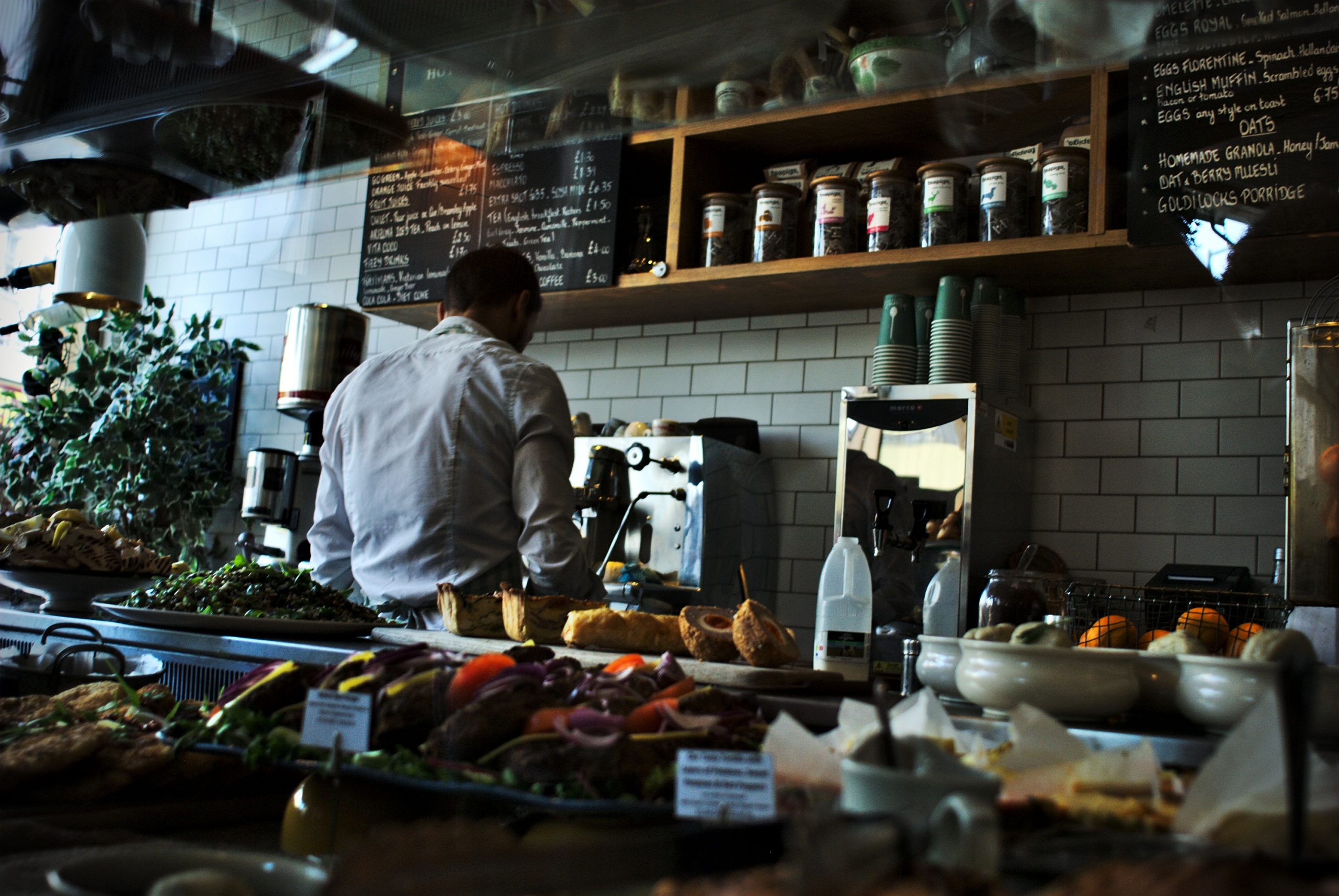
I wanted to share with you an exceptional program I have been involved with that is currently seeking volunteers.
Work Life from Jobs for Life, is an eight-week Biblically based program that seeks to break the cycle of joblessness and poverty by giving people the tools they need to find and maintain meaningful employment.
Mentors, teachers and professional coaches are needed for the upcoming class which will meet January 9 – March 9, 2023 on Mondays and Thursdays from 7pm – 9pm at the Lamb Center, 3160 Campbell Drive, Fairfax, VA 22031. Business owners and managers who are interested in helping people step into financial health are also needed.
While this is a Christian-based program, I have worked with volunteers and clients from a of a variety of faith traditions. It is so rewarding to be reminded of the brotherhood of humanity as together, we restore a sense of purpose and dignity to people and families in need.
There will be an In-person interest meeting on Saturday, October 29 from 1:00 pm – 2:00 pm at the Lamb Center.
For additional information, please visit this write-up from Centreville Presbyterian Church: https://centrevillepres.com/project/jobs-for-life/
This blog post is the expressed opinion of its writer and does not necessarily reflect the views of Tysons Interfaith or its members.

Have you been thinking about volunteering and you’re wondering what organizations are out there needing help? Here is a great opportunity for you to explore.
On October 12, 13, and 14, 2022, Fairfax County will host a virtual “Venture Into Volunteering Fair.” More than two dozen non-profit organizations and Fairfax County agencies will share how they incorporate volunteers into service, and all will be available to answer questions. (Although this event is listed on the Fairfax County Department of Family Services Older Adults webpage, volunteerism has no age restriction!)
Venture Into Volunteering Fair
October 12, 13 and 14
10:30 a.m. to 3 p.m.
passcode: venture22!
OR
by phone: 888-270-9936
Conference Code: 114531
You can join at any time, for any of the 30-minute presentations. No pre-registration is necessary.
For more information on the organizations featured in each session, and the daily fair schedule, visit the Fairfax County Venture Into Volunteering page. If you are unable to attend a particular session, or have questions after the event, feel free to reach out to that organization directly using the contact information in the daily fair schedule.
If you have questions about this event, technical assistance, or need reasonable accommodations, please contact VolunteerSolutionsRecruitment@FairfaxCounty.gov or call 703-324-5406.
Can’t make the virtual fair? Check out service opportunities and Tysons-area nonprofits listed on the Tysons Interfaith Resource page: https://tysonsinterfaith.org/resources/
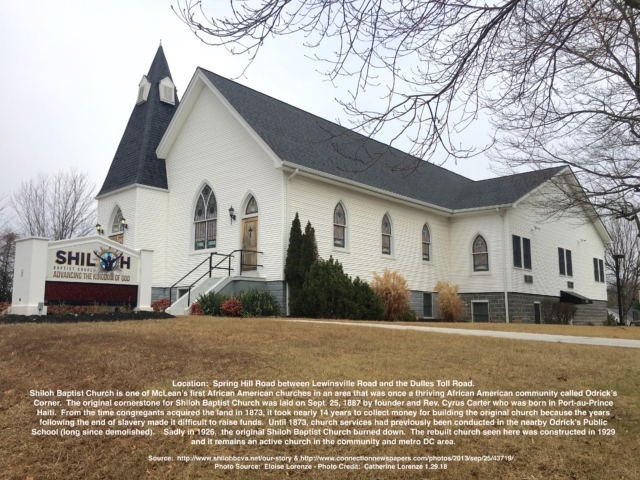
Shiloh Baptist Church, the beautiful church that sits on a rise just south of the intersection of Lewinsville Road and Spring Hill Road, celebrates 150 years of service to the community this year.
Founded in 1872 by Cyrus Franklin Carter, who also founded other churches in the area (First Baptist Church of Vienna and First Baptist Church Chesterbrook), Shiloh was central to the post-Civil War Odrick’s Corner Community. To read more about the history of the church, please visit shilohbcva.net/our-story.
To commemorate this special anniversary, Shiloh held a series of events including a community picnic in July, and a “Spotlight on Shiloh” event at the McLean Community Center in August. The celebrations culminated in a special worship service held on September 18.
The September 18 service, in addition to celebrating the church’s sesquicentennial, also recognized Rev. Dr. Robert F. Cheeks, Jr., and his wife, Minister Constance Cheeks, for their fifteen years of leadership to the congregation. It was a joyous occasion that included the presentation of a commendation from Fairfax County by Board of Supervisors Chairman Jeff McKay, and the reading of congratulatory messages from Governor Youngkin, the leadership of National Cathedral, and from Lewinsville Presbyterian Church which has been partnering with Shiloh Baptist in Bible study.
Shiloh Baptist is a member of Tysons Interfaith. At least four Tysons Interfaith communities were represented at the September 18 service. Pictured here at the service is Fazia Dean of Dar Al-Hijrah Islamic Center.
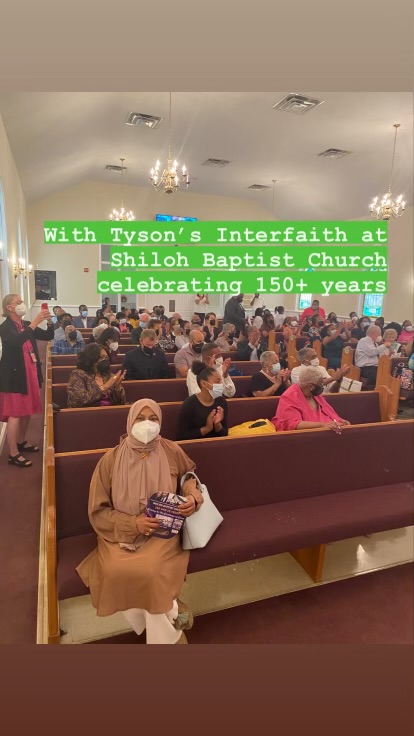
Tysons Interfaith congratulates Shiloh Baptist on their 150 years of enduring service to the local community. We look forward to continuing to partner with them to weave the values of spiritual connection, spiritual learning, mutual support, and community service into the fabric of the greater Tysons area.
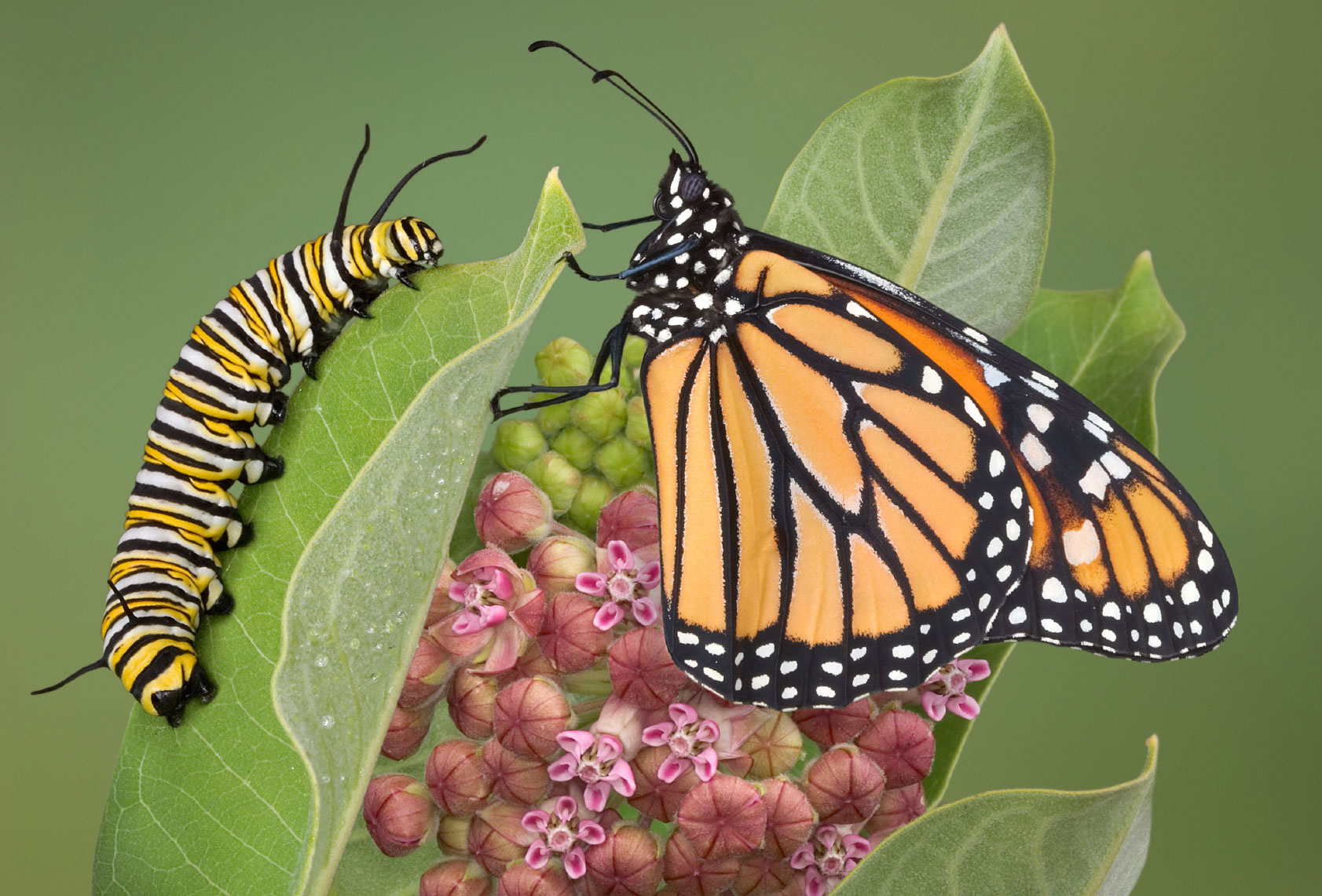
A recent lead article in the Christian Science Monitor Daily really caught my attention. On September 15, editor Mark Sappenfield published a piece entitled “Butterflies, capitalism, and the golden rule.”
Butterflies, capitalism, and the golden rule

Editor
| When the world gathers in New York next week for the United Nations General Assembly, Kim Polman will be there to talk about butterflies – kind of. Ms. Polman is co-founder of Reboot the Future, an organization built on the idea that the golden rule – cherished in various forms by all human cultures – is the basis for societal and economic transformation. Ms. Polman is not alone in thinking capitalism needs a reboot. On one hand, capitalism has generated unprecedented wealth, lifting wide swaths of the world out of poverty. But it is also at the basis of what some call the “death economy” – extractive and exploitative practices built on competition run amok. She’ll be in New York to discuss the new book she helped write, “Values for a Life Economy.” The key to pivoting from an extractive, exploitative capitalism to one that embraces all and the planet is recognizing our deep interconnection. “We are all connected, and we are all responsible,” she says. “We need to wake up to the idea that we are not just here for ourselves.” She’s talking about nothing less than a shift in our economic paradigm. From the days of Adam Smith, capitalism has been about how competition holds our lower natures in check. Can we really expect more of ourselves as humans? That’s where the butterflies come in. When the caterpillar starts its metamorphosis, its cells actively resist. It tries to stop the process. “But the cell that holds the vision of the butterfly is innate in the caterpillar,” she says. The ability to transform is already there, and it only becomes active under duress. For humans, she says, that visionary cell is the golden rule – the innate, natural impulse to treat others and the world the way you would wish to be treated. “Our work,” she says, “is to reach a tipping point.” |
Isn’t this a wonderful thought to be discussing at the United Nations? An economic paradigm shift based on a deeper understanding of the Golden Rule.

Over 40 years ago the United National General Assembly established the International Day of Peace. In 2001 they unanimously clarified the day as being dedicated to strengthening the ideals of peace among all nations and peoples of the earth. This year’s Day of Peace theme is End Racism. Build Peace
With all the serious challenges to peace around the world, and right here in the US, Tysons Interfaith will highlight the 2022 International Day of Peace (September 21, 2022) with a continuation of our Oneness of Humanity series.
The Oneness of Humanity series began in the summer of 2020, when Tysons Interfaith hosted an on-line discussion about the concept of the “Oneness of Humanity,” and what it means from different faith traditions. In the ensuing months, we also explored “Since we are one, how do we deal with race?” and “Do you feel a call to take action (to build an equitable society)?” The series has continued since 2020, exploring topics of common interest to people of all faith traditions and spiritual practices.
The title of our September 21, 2002 Oneness event is: Building Peaceful Communities, Promoting Mutual Respect: A Call to Action. The event will be held on Zoom from 7:00 – 8:30 pm, and will be facilitated by Dara Feldman, an educator, international speaker, author and founder of Virtues Matter. We will explore learning language and practical skills to promote peace, and how to recognize virtues in others to build/repair relationships and foster mutual respect. We hope you will join us!
To register and learn more about this event, please visit tysonsinterfaith.org/iwe-event/building-peaceful-communities/.
This blog post is the expressed opinion of its writer and does not necessarily reflect the views of Tysons Interfaith or its members.
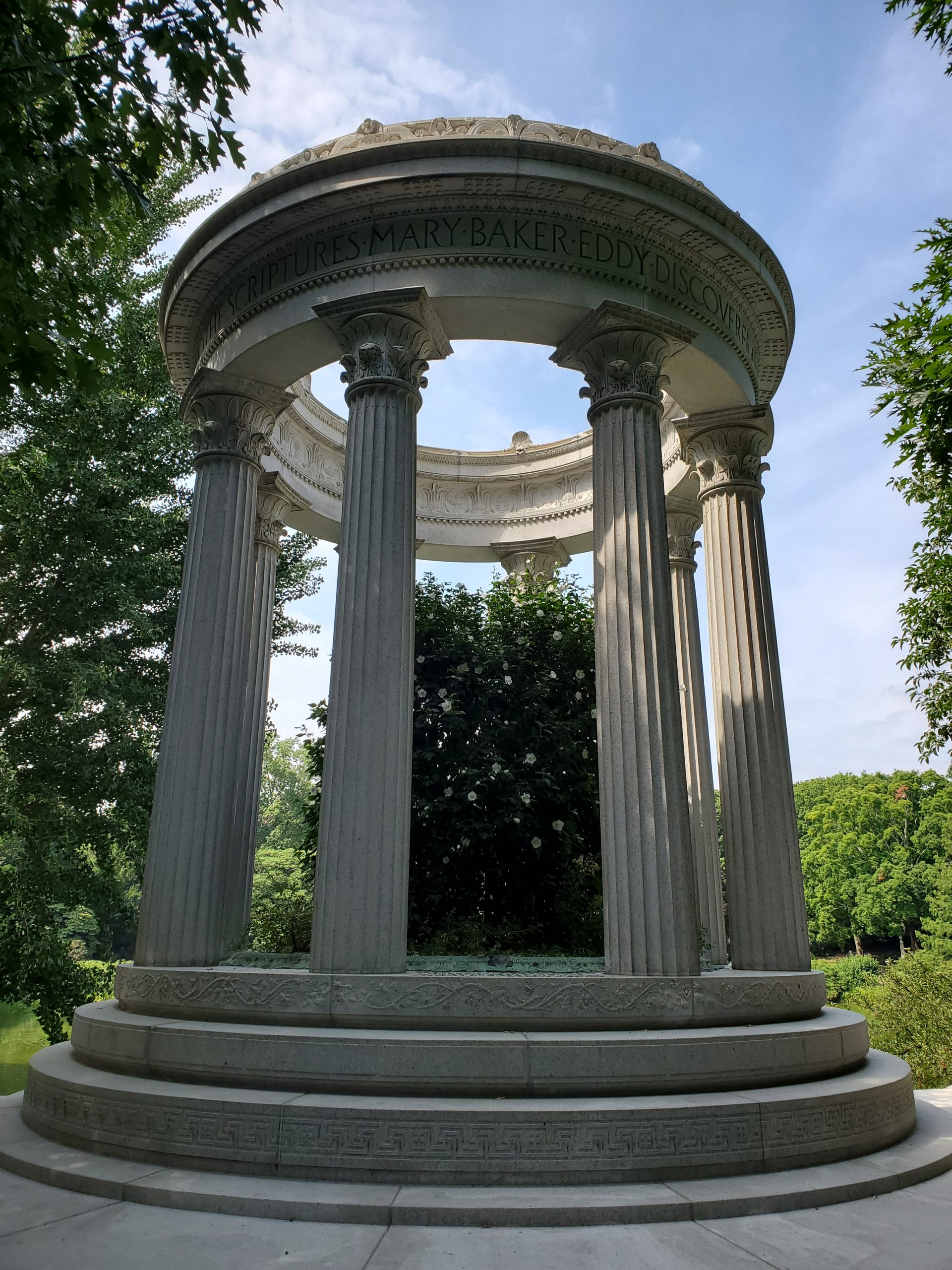
I recently visited Boston to visit my brother, and among a few other outdoor things, we visited Mt. Auburn Cemetery. Designed by Frederick Law Olmstead, who also designed Central Park, it is a beautiful array of trees, plants, ponds, and a stunning view of downtown Boston. Several luminaries are honored there, including Longfellow, Winslow Homer, Julia Ward Howe, and Oliver Wendell Holmes Sr. But three of the memorials in particular caught my eye.
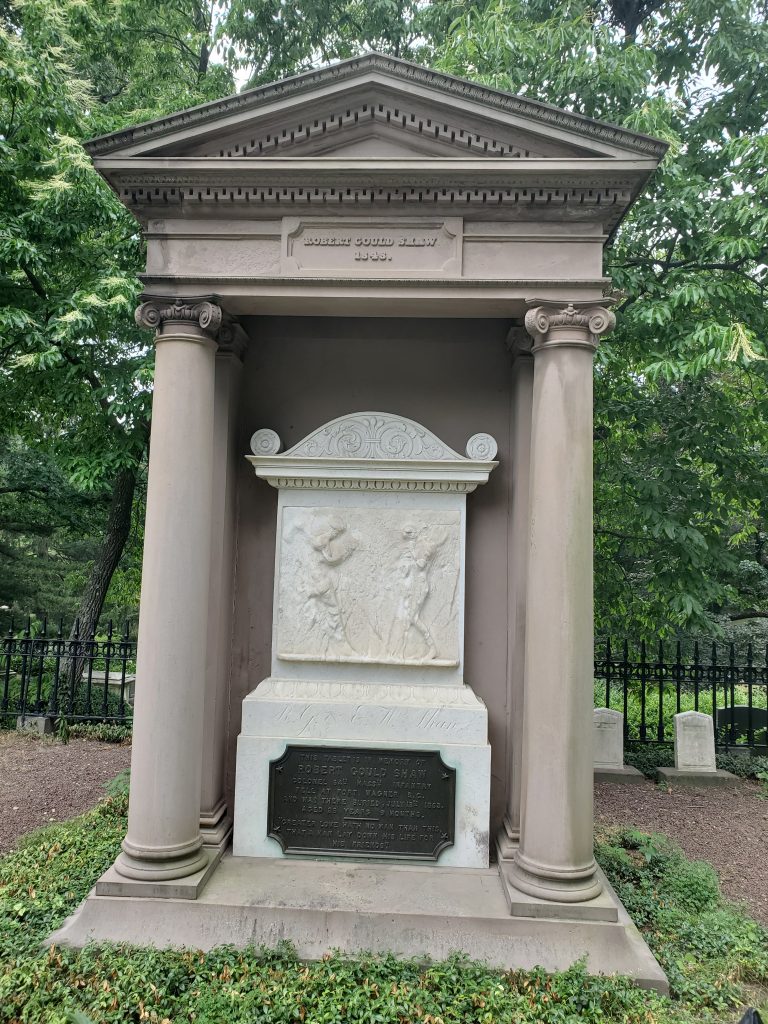
Robert Gould Shaw, born into a prominent Boston abolitionist family, accepted command of the first all-black regiment of the Civil War, the Massachusetts 54th, at age 25. As featured in the movie Glory, Shaw fought for the interests of his troops, and for their opportunity to participate seriously in the war. They got that opportunity in the bloody Battle of Fort Wagner, South Carolina, in which Shaw and many in his regiment were killed. The confederate general returned to the Union army the bodies of all Union officers that were killed, except for Shaw, since he commanded a black unit. Shaw was buried with his troops in a mass grave. Shaw’s father was proud of that fact, stating, “We would not have his body removed from where it lies surrounded by his brave and devoted soldiers . . . We can imagine no holier place than that in which he lies, among his brave and devoted followers, nor which for him better company – what a body-guard he has!” The memorial to Shaw pictured below was erected in Mt. Auburn Cemetery, where some of his relatives are buried. There is also a famous sculpture of Shaw and the 54th Regiment in the National Gallery of Art.
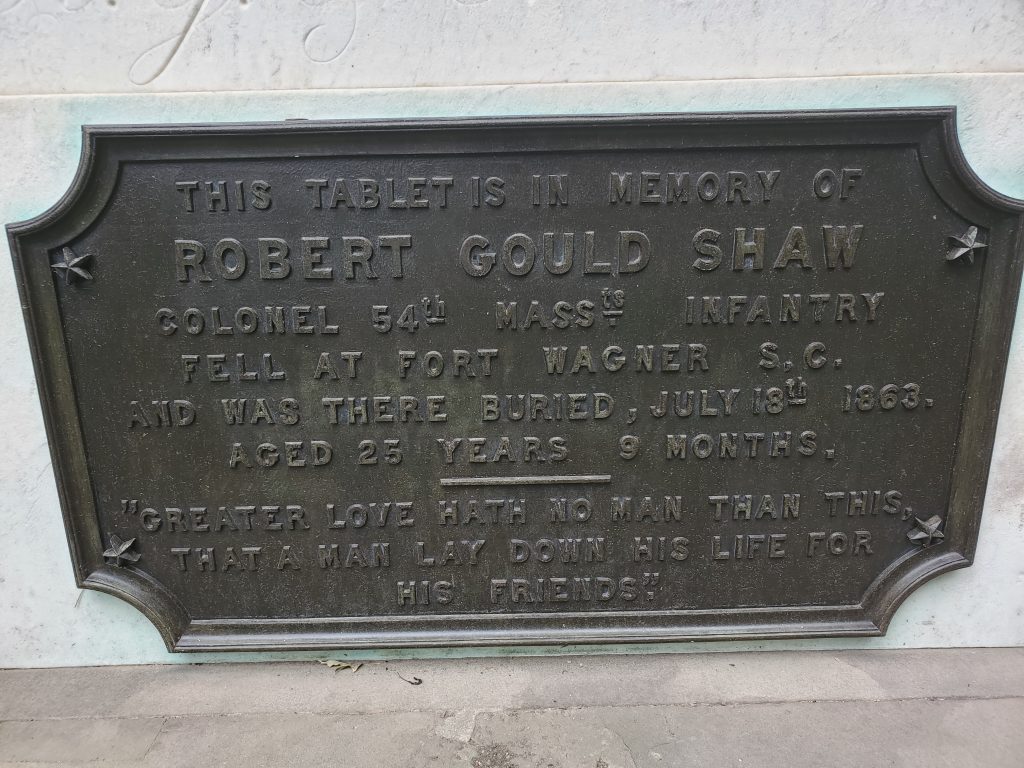
Dorothea Dix is memorialized by one of the plainer markers in the cemetery, which is fitting for someone who was a tireless and unselfish reformer for others, even though she suffered from numerous physical and mental health challenges of her own. She grew up in Worcester, Mass. In 1840-41, Dix did a statewide investigation and report of treatment conditions for the mentally ill in Massachusetts, resulting in expanded hospital facilities in the state. She did similar studies in many other states, including New Jersey, New Hampshire, Louisiana, and North Carolina, as well as Scotland and Nova Scotia. While facilities remained inadequate, her tireless activism helped improve care for the mentally ill. She was also appointed Superintendent of Army Nurses in the Civil War, overseeing over 3,000 nurses, though her strong views sometimes clashed with other leaders. Among other things, she encouraged her nurses to provide treatment to all those suffering. One of her nurses stated, “Many of these were Rebels. I could not pass them by neglected. Though enemies, they were nevertheless helpless, suffering human beings.”
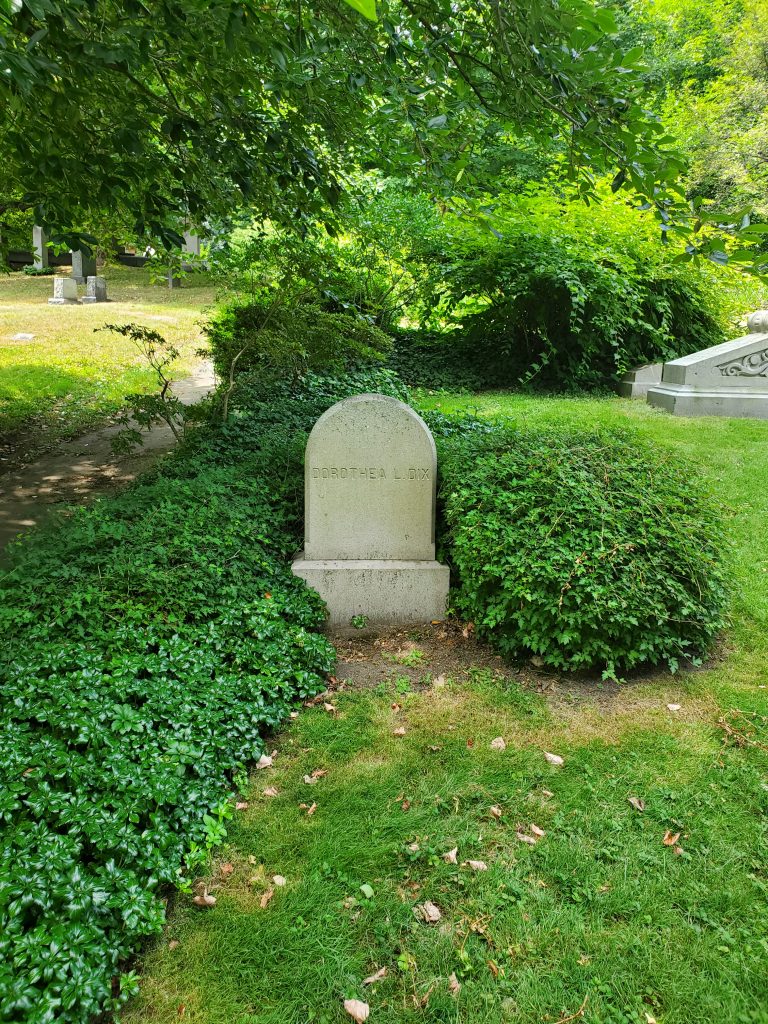
Mary Baker Eddy led Christian Science, which is part of the Tysons Interfaith group. She is honored by a beautiful monument at the side of a beautiful wooded pond. Eddy contributed greatly to American religious thought in the 19th century, and the Christian Science Monitor continues to be a thoughtful and influential publication.
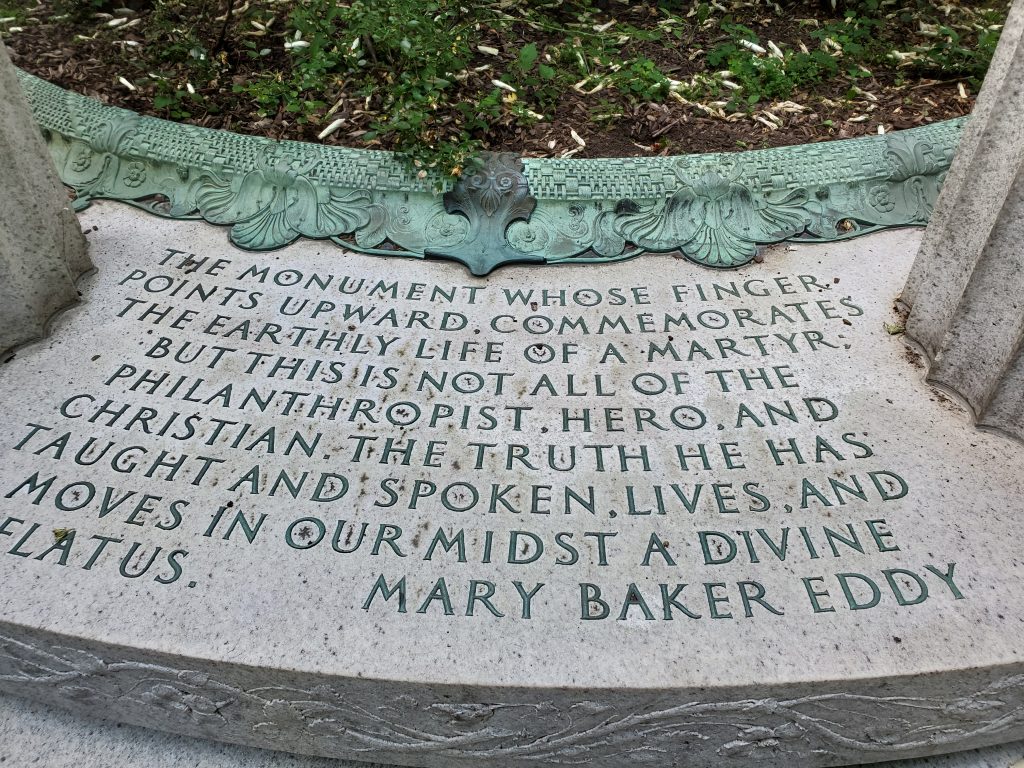
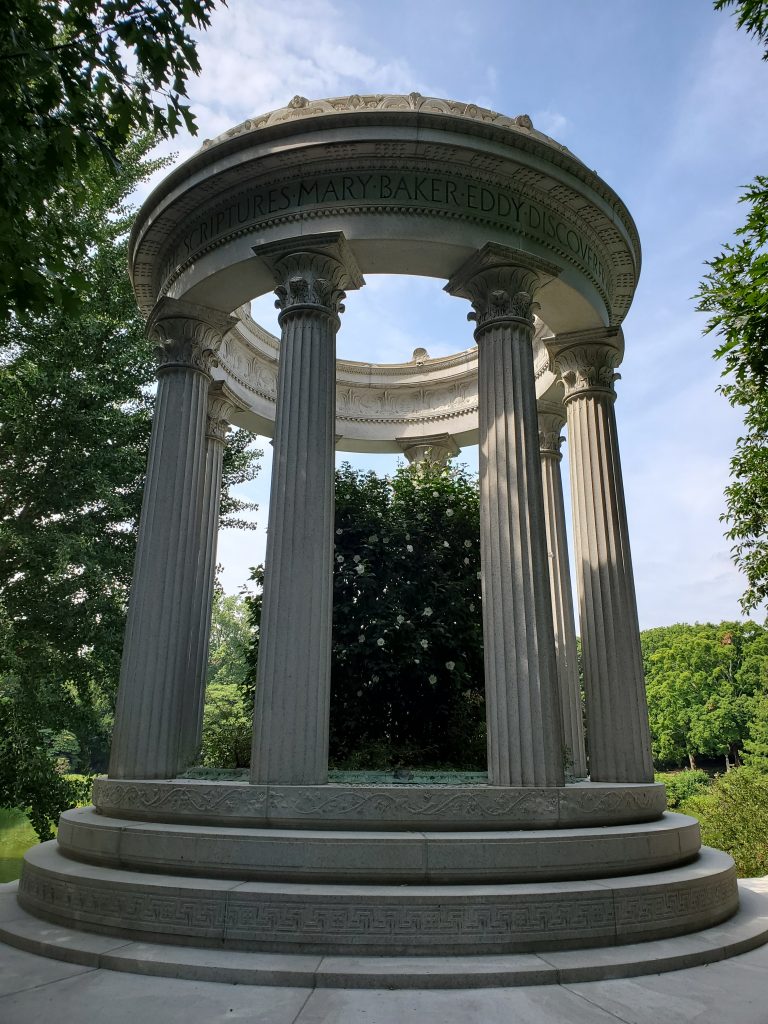
This blog post is the expressed opinion of its writer and does not necessarily reflect the views of Tysons Interfaith or its members.

Over 40 years ago the United National General Assembly established the International Day of Peace. In 2001 they unanimously clarified the day as being dedicated to strengthening the ideals of peace among all nations and peoples of the earth. The theme for this year’s Day of Peace is End Racism. Build Peace.
For the 2016 United Nations International Day of Peace, Centers for Spiritual Living formally recognized the Collective Meditation for Peace Initiative as an integral and essential element of our organization. Its driving purpose is to raise the consciousness of peace around the world.
So, what are we doing about it?
The Collective Meditation for Peace Initiative coordinates the weekly Heart of Peace Meditations on Facebook every Monday afternoon at 1:00 PM MT. Team members are “vision led” to provide an array of meditation experiences throughout the year.
The Heart of Peace team invites everyone to take a deep dive into their spiritual practices, committing to daily peace prayers in total confidence that we do have the power to change the world using affirmative prayer – Peace shall prevail! The team is fostering the emergence of a world in which compassion and empathy overcome suspicion and hatred. A world that we can truly be proud of.
Our next event “One World, One Lover, One Peace” is on United Nations International Day of Peace, September 21st the 2022 on Facebook.
To achieve enduring Peace we collaborate, connect and take actions collectively. The Heart of Peace team is always seeking ways in which it can engage people … to attract spiritual activists with a passion for peace. We began by becoming clear observers, honest evaluators and dedicated doers. We have discerned the components of peace and identified actions that synergistically bring about experiences of peace. In collaboration with other organizations, we produce events and promote those of other peace organizations and our communities such as the Global Chain Reaction for Peace created by the Center for Spiritual Living Geneva [Switzerland]. This past year we have featured the World Healing Peace Meditation, provided a Pause for Peace at the Centers for Spiritual Living 2022 Convention, produced a daily meditation guide posted on Facebook every day of the Season of Peace and Nonviolence, hosted World Labyrinth Day and the United Nations International Day of Peace.
Individually and collectively the Heart of Peace team members remain keenly alert to ways in which to remove obstacles to the free flow of peace around the world. Acknowledging that a lack of information and education about other cultures and traditions, has been one of the primary forces obstructing universal peace, team members have engaged with other organizations to break such barriers.
And, there are more ways in which Centers for Spiritual Living is bringing forth world peace …
Global Services Committee, in fulfillment of our Global Vision of “… a world in which we live and grow as One Global Family that respects and honors the interconnectedness of all life; a world where this kinship with all life prospers and connects through the guidance of spiritual wisdom and experience” works diligently worldwide connecting and nurturing global relationships. These connections make it possible for people to learn about other cultures and make personal connections – essential components of world peace.
Our Diversity Equity Inclusion Committee is dedicated to working toward a world that embraces and celebrates diversity and eliminates all expressions of prejudice in alignment with the United Nations 2022 theme of “End Racism. Build Peace.”
We envision a world that works for everyone and for all creation and are committed to doing our part to make peace magnificently ordinary rather than something exceptional to be achieved.
(Coming next: International Day of Peace, September 21, 2022 – What Tysons Interfaith is Doing to Support It)
###
United Nations International Day of Peace 2022 Theme: “End Racism. Build Peace.”
Look for Peace Day activities in your own community and around the world: *Minute of silence at 12 noon (all time zones) *Peace education events *Intercultural and interfaith dialogues *Workshops on the UN Peace Day theme *Meditation and prayer *Planting peace poles *Community gatherings *Vigils *Concerts and festivals
This blog post is the expressed opinion of its writer and does not necessarily reflect the views of Tysons Interfaith or its members.
